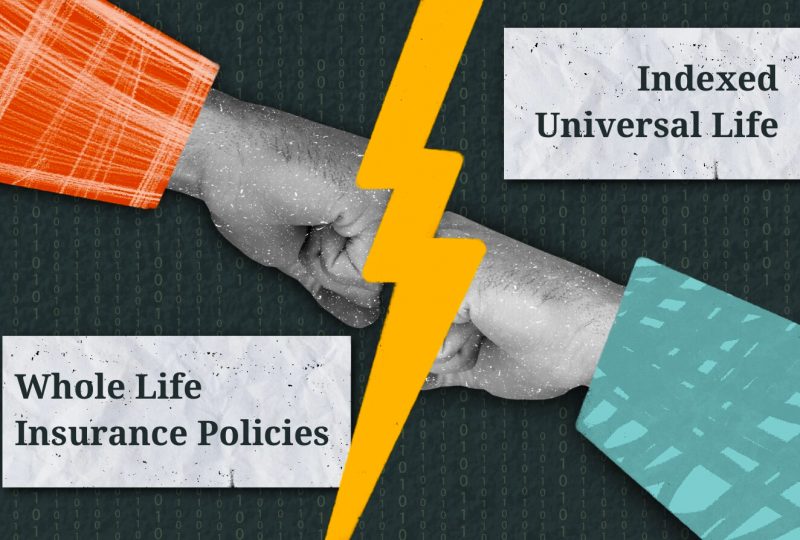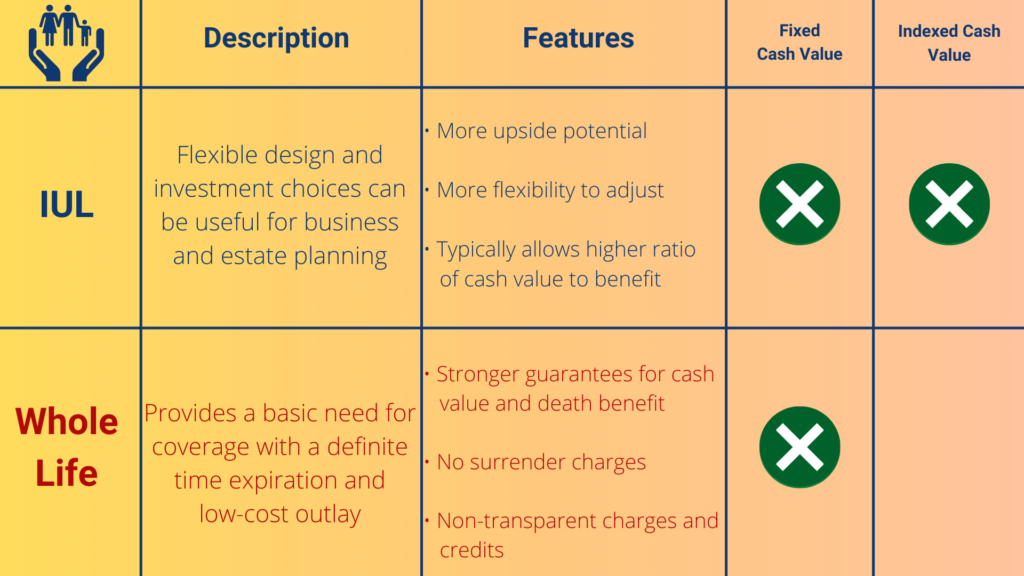All Categories
Featured
Table of Contents
Indexed Universal Life (IUL) insurance policy is a kind of irreversible life insurance coverage plan that incorporates the functions of conventional universal life insurance with the capacity for money worth growth linked to the performance of a stock exchange index, such as the S&P 500 (IUL for retirement income). Like other types of irreversible life insurance policy, IUL gives a death benefit that pays to the beneficiaries when the insured dies
Money value build-up: A portion of the premium payments enters into a cash money worth account, which earns passion in time. This cash value can be accessed or borrowed versus throughout the policyholder's life time. Indexing choice: IUL policies use the opportunity for money worth development based upon the performance of a supply market index.
Who are the cheapest Iul Companies providers?
Just like all life insurance policy items, there is also a set of dangers that insurance policy holders must be mindful of before considering this kind of plan: Market risk: One of the primary threats related to IUL is market threat. Given that the money value development is connected to the efficiency of a stock exchange index, if the index performs poorly, the money worth may not grow as expected.

Sufficient liquidity: Insurance holders must have a steady economic circumstance and be comfortable with the premium payment requirements of the IUL plan. IUL permits flexible costs settlements within certain limitations, yet it's vital to maintain the policy to guarantee it attains its desired goals. Passion in life insurance policy coverage: People who require life insurance policy protection and a passion in cash money worth growth may locate IUL enticing.
Candidates for IUL should be able to comprehend the mechanics of the plan. IUL may not be the most effective option for individuals with a high resistance for market threat, those who focus on inexpensive investments, or those with even more prompt financial requirements. Consulting with a certified economic consultant who can offer tailored support is necessary before considering an IUL policy.
All registrants will get a calendar invite and link to join the webinar through Zoom. Can not make it live? Register anyway and we'll send you a recording of the presentation the next day.
Iul Growth Strategy
You can underpay or miss costs, plus you might be able to readjust your survivor benefit. What makes IUL various is the method the money value is invested. When you obtain an indexed global life insurance policy policy, the insurer supplies a number of choices to pick a minimum of one index to use for all or part of the cash money worth account segment of your policy and your death benefit.
Cash money value, along with possible growth of that value via an equity index account. An alternative to allocate component of the money worth to a fixed rate of interest option.
Insurance holders can choose the percentage alloted to the repaired and indexed accounts. The value of the selected index is tape-recorded at the start of the month and compared to the worth at the end of the month. If the index enhances during the month, rate of interest is contributed to the cash money worth.
The resulting interest is added to the money worth. Some policies calculate the index gets as the sum of the adjustments for the period, while other policies take a standard of the everyday gains for a month.
What is the most popular Iul Policy plan in 2024?
The price is set by the insurance provider and can be anywhere from 25% to even more than 100%. (The insurance provider can also change the participate price over the lifetime of the policy.) For instance, if the gain is 6%, the participation price is 50%, and the current cash worth overall is $10,000, $300 is included in the money value (6% x 50% x $10,000 = $300).
There are a number of pros and disadvantages to consider before buying an IUL policy.: As with conventional universal life insurance policy, the policyholder can boost their premiums or lower them in times of hardship.: Quantities credited to the money value grow tax-deferred. The money value can pay the insurance policy premiums, enabling the insurance holder to lower or quit making out-of-pocket costs repayments.
Where can I find Indexed Universal Life Insurance?
Lots of IUL policies have a later maturity day than other kinds of universal life plans, with some ending when the insured reaches age 121 or more. If the insured is still to life during that time, plans pay the survivor benefit (however not generally the cash worth) and the profits might be taxable.

: Smaller sized plan stated value don't provide much benefit over routine UL insurance coverage policies.: If the index goes down, no rate of interest is credited to the cash money worth. (Some policies use a low assured price over a longer period.) Other investment vehicles utilize market indexes as a benchmark for performance.
With IUL, the goal is to make money from upward motions in the index.: Since the insurance coverage company just gets options in an index, you're not directly bought supplies, so you don't profit when business pay dividends to shareholders.: Insurers cost costs for handling your money, which can drain money worth.
Iul Interest Crediting

For many people, no, IUL isn't far better than a 401(k) - High cash value Indexed Universal Life in regards to saving for retired life. A lot of IULs are best for high-net-worth individuals looking for ways to reduce their taxable revenue or those that have actually maxed out their other retirement options. For every person else, a 401(k) is a far better investment vehicle due to the fact that it does not lug the high costs and costs of an IUL, plus there is no cap on the quantity you might gain (unlike with an IUL plan)
While you might not shed any cash in the account if the index goes down, you will not make interest. If the marketplace turns favorable, the earnings on your IUL will certainly not be as high as a common investment account. The high cost of premiums and charges makes IULs costly and substantially much less budget-friendly than term life.
Indexed global life (IUL) insurance coverage supplies cash value plus a survivor benefit. The cash in the cash value account can gain interest with tracking an equity index, and with some commonly alloted to a fixed-rate account. Indexed universal life policies cap how much money you can gather (typically at less than 100%) and they are based on a possibly volatile equity index.
Iul Premium Options
A 401(k) is a far better option for that function because it doesn't bring the high fees and premiums of an IUL policy, plus there is no cap on the quantity you may earn when spent. A lot of IUL policies are best for high-net-worth individuals seeking to reduce their taxed earnings. Investopedia does not supply tax obligation, financial investment, or financial services and advice.
If you're thinking about buying an indexed universal life plan, initial consult with a financial advisor who can explain the nuances and provide you an exact image of the real capacity of an IUL plan. Make certain you recognize just how the insurance firm will calculate your interest price, profits cap, and costs that may be examined.
Latest Posts
Life Insurance Tax Free Growth
Iul Investment Calculator
What Is The Difference Between Universal And Whole Life Insurance